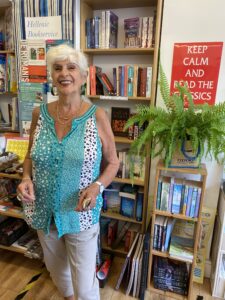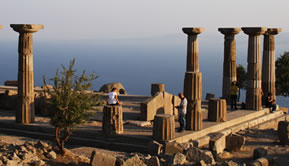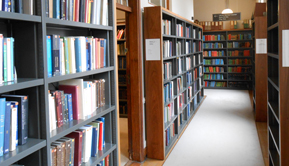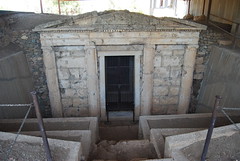Monica Williams is the owner of the Hellenic Bookservice in London. Believed to house the largest collection of Classics and Modern Greek books in the world, the bookshop has numerous titles on ancient history, culture, mythology and religion, as well as literature and language. Established in 1966, the Bookservice will be celebrating its 60th birthday in 2026. Monica caught up with Caroline K. Mackenzie, whom she first met in 1989 at the JACT (Joint Association of Classical Teachers) Greek Summer School at Bryanston, one of many summer schools at which Monica is a popular visitor with her enticing array of Greek and Latin pencils, posters, new and second-hand books.

Monica in the shop (© Hellenic Bookservice)
I started the bookshop with my mother. My mother was Greek; she had written a phrase book in Greek, and had run another Greek bookshop (from 1944). My mother came from Cyprus, as did my father, who was a violinist and came over here to study the violin and then the war broke out. My mother was very educated, which was unusual. She always came top in everything. I was an only child and she expected a lot from me: I was always getting told off!
My mother was suddenly made redundant from her bookshop job with no notice so she was lucky enough to be asked to catalogue all the Modern Greek Books in the British Library. It was after that when we decided to try and open a bookshop by ourselves at 122 Charing Cross Road. I had two small children at the time. It was an adventure, but it was quite tough. It was a complete risk as we had no backing and no money.
My father ended up teaching Modern Greek here and then he went back to Cyprus but my mother didn’t want to return there. To be a woman in Cyprus then was very difficult – it was the same in a lot of countries in those days but it has now changed – a woman was expected to stay at home. My mother worked with me in the shop until she was in her 90s.
Foyles was opposite us, which was an absolute joy. Foyles was split into two at that time and there used to be a book café in between them. That is where all the reps used to go and then they used to come and chat to me. I lived in Shaftesbury Avenue and was brought up in the West End. I was privileged in the fact that, although I was an only child, I thought that everyone used the British Museum as a local! I lived in the theatre; The Dominion and The Astoria were my locals. I saw a lot of live theatre, including a performance by Judy Garland, and I still have all my programmes from the 1950s.
When choosing the name of the shop we wanted to come up with something which related to the Greek world. At that time, we didn’t do much Latin. We had a lot of books on archaeology and sculpture and, in those days, many of them were written in German. There was very little written on those topics in Greek at that time. We always had a lot of Ancient Greek books.
From an early age, my son and daughter spent a lot of time in the shop with me. Later on, they both worked with me, too. My daughter still sometimes comes to exhibitions with me. My son is now my business partner.
I have often been asked why I get such good service from publishers. Well, when I started, reps got commission for orders. Therefore, I used to send orders to them directly. My Penguin rep became Managing Director for Penguin.
To start with, the shop was tiny but up to the ceiling with books, mainly Modern Greek and Ancient Greek. I have customers who still remember it. Some of them were students then and are now very well-known authors. I took a big risk when starting to stock Latin books and materials, as I was completely new to it.
I bought my first Loeb from the Heineman Trade Centre. This was a short walk from the bookshop in Bloomsbury. Gradually I bought more and more until they were regular stock in the shop. At one point I supplied the Delphi Museum with every Loeb.
It was so different in those days. It was hard work. We used carbon paper and typewriters. It was not like now when, if you make a mistake, you can just delete it. We had four big volumes of Whitaker’s ‘Books in Print’. It was a nightmare to look up any book, but it taught me a lot about research. I had to type everything as it was before computers. I was in Charing Cross Road for 24 years and had to move as the premises were wanted. They are occupied by TK Maxx now. When I moved to NW5 it was very difficult to start with. I asked everyone how I could get more business as it was not a shop with a passing trade.
I have been in three premises in this street. I was next door to where I am now and I had the whole building. Then the landlord wanted to renovate the building so I went to the Piano Factory further down. That landlord put the rent up so high and said to me, “I can see you are a business lady - are you sure you want to stay?” When he told me the new rent I said, “I’m not that much of a business lady!” And then we came here.
One day a woman called Miss Plato came into the shop. She asked me if I would like to attend a meeting at Queens’ College where Reading University was recruiting students. I said, “Yes, please”. Miss Plato wasn’t actually anything to do with Classics, she was one of the administrators. She was a very old-fashioned lady and lovely. Just before I was due to attend the meeting, I had a telephone call to say that Peter Jones, who was the guest speaker, had been delayed so could I give a talk? I had no time to prepare but I just talked about anything and sat down with great relief. At the end of the meeting, I was passed a note by another lovely lady called Pam Perkins asking me if I could take my books to an ARLT (Association for Reform of Latin Teaching) conference at the City of London Girls school. I had no idea at the time who ARLT was but I said yes. Since then, I have done two exhibitions a year for them. I built up my schools’ network from nothing by doing conferences, etcetera, which are hard work but very rewarding.
What I love about the summer schools are the children. The best summer schools have timetables that include gaps which allow people to talk among themselves. The students don’t just want to attend lectures; they want time to talk to others with similar natures and that’s what happens. I like working with younger people. I am fortunate to go to the summer schools – I get on with everyone and, as long as I am given my tables to display my merchandise, I shut up! A lot of people like to buy the Latin and Greek pencils as prizes for their pupils and schools really like the posters, too.
Books are so much more friendly these days, especially those for children. It makes me want to read them – I read a lot. I didn’t used to take many children’s books to exhibitions, but this year at Bryanston the youngsters were buying the books for their one-year-old nephews or similar. They are so enthusiastic that they are trying to get their younger family members interested.
Demand has increased over the years for philosophy and mythology. Unfortunately, there is less demand for Classical Civilisation books. It is such a shame – young people love the fascinating topics this subject offers, such as warfare, Pompeii, houses, slavery, law, numismatics, etc.
Our Modern Greek department is flourishing, including our second-hand section. The department covers all subjects, from travel, cookery and children's books to literature, history, games and DVDs. We also stock books on Theology and New Testament (Koine) Greek. We can also obtain any book in print and source out of print titles. People come from all over the world for the Modern Greek books. Unfortunately, the prices of import (postage and duty) have escalated because of Brexit.
I am just trying to survive at the moment. Because of the impact of Covid, I am in danger of closing. I almost got to the stage of crowdfunding. Books do not make a lot of money. Some schools go to Waterstones or Amazon as they say they are getting bigger discounts, but I can actually compete if I am given the chance. I can also supply any book in print in any subject. I have just supplied one school with books for 12 different subjects, including history, geography and science: not just classics! People are beginning to come back after Covid, thank goodness. I have a new motto: “Amazon is in competition with me!”
The shop is more colourful now than it used to be. I have very good staff who, among other things, have created the window displays. I am very reliant on them. I did not know until recently about Twitter, Facebook, etc. It is all new to me. I have had to change, not just from typing on a typewriter to modern technology. Alina has been with me quite a few years now – she is Romanian and speaks perfect English but loves the fact that I speak so much idiomatic English. She has a little notebook and takes notes all the time! Because both my parents were Greek, I am used to translating so I can appreciate what she needs. Brendan has been with me for over five years and he is a real asset to the shop.
My advice for anyone considering learning Ancient and/or Modern Greek is to take it easy and don’t try to do too much. Learn the alphabet first as it’s easy: you read what you see. It’s not like English, e.g. why is vegetable pronounced as it is and not “vej-ee-table”? In Greek, once you have learned the alphabet, it is easy if you then take it slowly. It’s the same approach as to children’s reading - you don’t want to put them off learning.
My favourite Greek place is Crete, on which my son is an expert; and, of course, Cyprus in particular where my family come from: Limassol. There are a lot of very high buildings there now but the old town is still nice. It is 44 degrees there at the moment.
My favourite Greek poet is Cavafy. Years ago, I used to have a very good friend who was a writer, and in the times of the Colonels it was terrible. We would sit at a table chatting over coffee and look around in case anyone overheard. Government bans affected authors’ employment. There was also Theodorakis, who is a wonderful composer, and Ritsos, who set his words to music. My mother and I brought back with us from Greece a lot of the poetry that was banned there.
My favourite Ancient Greek author is Herodotus because he liked travelling, as do I. Homer is also fantastic.
My husband, Frederick, was in publishing. He worked for Cambridge University Press and used to sell books to me when I was in Charing Cross Road. Everyone said I only married him so that I could get bigger discounts! We never bore each other. He’s 94 and he still drives our van to exhibitions.
Once a schoolteacher brought her whole class into the shop. It was fantastic. The children couldn’t get over it. It was a local school. The children were sitting on the floor and all over the shop – I loved it. I do need schools to use me!
ARGO is a lovely magazine. The covers are beautiful – they really make you want to read it. It has some wonderful contributors. One of my favourites is Paul Cartledge. I remember sitting behind him at the Cambridge Greek play, which is always performed in Ancient Greek, and joking with him, “Do you actually understand what they are saying?” I have been privileged to have met so many wonderful people. David Raeburn came up to me once when I was doing an exhibition in Oxford and told me that his book on Aeschylus’ Agamemnon was being published. He also wanted to publish an accompanying CD but it was proving impossible. I advised him to publish it himself, which he did. It is a reading of The Agamemnon. There is very little available on the spoken word in Ancient Greek. We have sold a lot of copies of his CD to America. David was a lovely man, really marvellous. James Morwood was another fabulous man. At the summer school, James used to come up and ask me if it was alright if he brought his students in before anyone else, while I was still setting up, which of course I allowed him to do!
If I were hosting a symposium and could invite anyone from the ancient world, it would be Plato. I’d also invite Virgil. I knew David West who translated Virgil’s Aeneid. I did an exhibition in Newcastle and there was a special room which belonged to one of the librarians with little bits of art everywhere. David was a quiet man but I remember he came into this room and put his book on top of one of the statues on purpose because he wanted to see the librarian’s reaction. When the librarian asked what was going on, David started giggling. I also remember that David always used to wear sandals.
I still really enjoy what I do. I love people. I don’t want to give up. But I do like holidays! My mother used to like holidays, too. I don’t have one booked at the moment as I am busy preparing lots of orders for the new school year.
My secret? I’ve been doing water aerobics for years. Plus, Greek food. I love Greek yoghurt and have it every morning for breakfast with fruit.
My hopes for the Hellenic Bookservice for the future, as well as just keeping going, are to do some book launches, and perhaps shopping evenings. I am open to suggestions!
As told to Caroline K. Mackenzie, August 2023
The Hellenic Bookservice is at 89 Fortess Road, London, NW5 1AG









